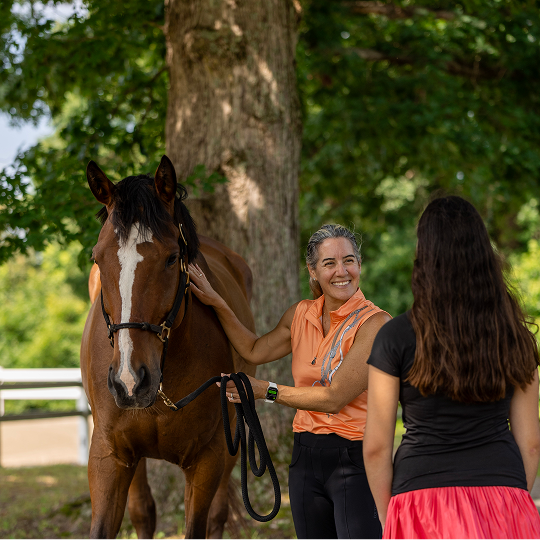Enquine Assisted Psychotherapy
Meet Taz, he is our equine partner at WML Wellness LLC and Wendie Lubsinky Counseling. He assists in the counseling process by helping clients gain awareness of the present moment. Often, we go about our day without being fully present. Our robotic lives can make us feel like we’re on autopilot, causing us to forget to be present and aware. Taz helps clients with their presence because it’s hard to stand next to a horse without noticing their majestic qualities, size, and gracefulness. A connection is formed between humans and horses that fosters trust, confidence, and opportunities for self-reflection, observation, and healthy attachment. Horses respond to people’s energy and spook easily, making them unpredictable and forcing us humans to adjust at a moment’s notice. Horses require people to adopt a flexible mindset and change their behavior and temperament, as horses are susceptible to our energy and will let us know.
How does Equine Therapy work at WML Wellness LLC

Equine-assisted psychotherapy, also called equestrian therapy or horse therapy, is a type of experiential mental health treatment that involves a
person in therapy interacting with horses. Designed for people of all ages, equine therapy has been shown to treat a wide range of mental health
issues, addressing both physical and psychological concerns.
Equine-Assisted Therapy vs Hippotherapy
Both therapies involve horses, but each addresses a different goal in overall health. Equine-assisted treatment focuses on addressing mental health, with patients caring for horses in a stable setting. Hippotherapy, on the other hand, is an approach to physical therapy that involves the patient riding horses to address physical health issues.
Hippotherapy is a combination word that encompasses the occupational therapy, speech-language pathology, and physical therapy components of this horse-riding therapeutic technique.
Equine-assisted therapy focuses on addressing mental health challenges. By caring for horses with a mental health professional present, patients can address their emotional and mental health issues. The emotional intelligence of horses helps patients enhance their self-confidence, overcome challenges, and establish lasting emotional foundations for success. Equine-assisted therapy has been shown to improve mental health, even reducing symptoms of mental health disorders.
History and Development
The idea of combining equestrian activities and philosophies with the treatment of physical and mental health issues dates back centuries. The ancient Greeks wrote about the benefits of horse riding, referring to this practice as hippotherapy (derived from the Greek word “hippo,” meaning horse).
It wasn’t until the mid-1900s, however, that modern psychotherapists started using existing principles of therapeutic riding developed to treat polio and other health issues for the treatment of mental health concerns. Equine-assisted psychotherapy as a modality grew out of therapeutic riding techniques and organizations designed to make horse riding accessible for people with disabilities.
Studies have shown people of all ages can benefit from equine-assisted therapy, and horses have been incorporated into treatment for a wide variety of issues, including:
- Cerebral palsy
- Inattention and hyperactivity (ADHD)
- Addictions and substance abuse issues
- Mood-related issues
- Autism
- Asperger's
- Learning difficulties
- Eating and food issues
- Grief and loss
- Trauma and posttraumatic stress (PTSD)
- Bipolar
- Depression
- Anxiety
Equine therapy can target physical concerns such as behavioral tics, motor control issues, balance, posture, and coordination-especially in children and teens with cerebral palsy. In other cases, working with horses helped by increasing individuals’ cognitive skills, reducing stress, easing symptoms of PTSD, and addressing symptoms of depression. Equine therapy has even been shown to, for some individuals, have a positive effect on destructive relationship patterns that have developed or behaviors that compromise health or safety.
In a study of over 30 individuals participating in an experiential equine-assisted therapy program, researchers found that the participants’ psychological distress was reduced immediately following treatment and that their psychological well-being improved. These positive effects held stable through a follow-up six months later.
Equine Therapy will take place at the barn where Taz is stabled.
Session cost: $185/50 minute session at the barn

Equine Assisted Therapy History and Information:
https://www.goodtherapy.org/learn-about-therapy/types/equine-assisted-therapy
Patient-Centered Communication (PCC) in Equine Assisted Mental
Health:
https://pubmed.ncbi.nlm.nih.gov/32586134/
Canine and Equine Therapy for Mental Health: A Review of Clinical
Effectiveness:
https://pubmed.ncbi.nlm.nih.gov/31682391/
Mental health benefits of mounted equine-assisted therapies: A
scoping review:
https://pubmed.ncbi.nlm.nih.gov/35811394/
Equine-assisted activities and therapies in children with attention-deficit/hyperactivity disorder: A systematic review:
https://pubmed.ncbi.nlm.nih.gov/33171006/
Equine-assisted psychotherapy with traumatized couples-Improvement of relationship quality and psychological symptoms:
https://pubmed.ncbi.nlm.nih.gov/33512042/
